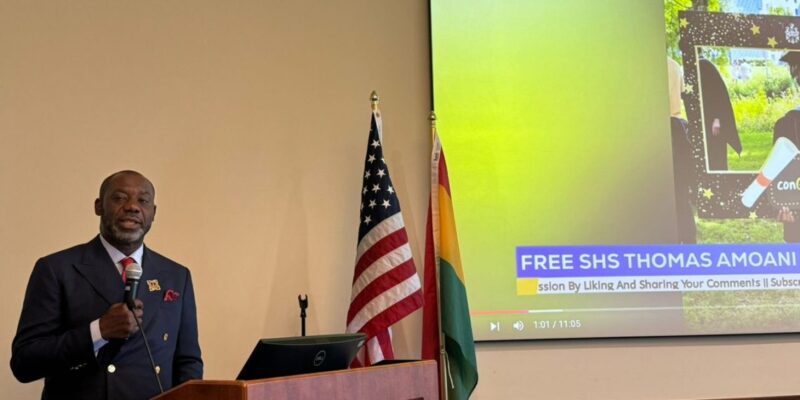The New Patriotic Party's (NPP) running mate, Dr Matthew Opoku Prempeh, has highlighted the significant achievements of Ghana’s Free Senior High School (SHS) policy, stressing its positive impact on educational outcomes and equity.
Speaking at the University of Memphis on Saturday, October 19, Dr Prempeh, widely known as NAPO, affirmed that the Free SHS programme has expanded access to education, particularly for disadvantaged students, while refuting claims that it has compromised the quality of education.
As the former Minister of Education during the policy’s implementation in 2017, NAPO emphasized that the initiative has strengthened academic performance and helped reduce educational inequality nationwide.
He noted that the programme has allowed more students to pursue secondary education without the financial obstacles that once hindered many Ghanaian families.
Dr Prempeh also highlighted the long-term benefits of the Free SHS policy, describing it as a vital investment in Ghana’s future.
He underscored that the programme is shaping a more educated and skilled workforce, which is essential for driving national development and improving the country's global competitiveness.
In addressing criticisms, NAPO reiterated that the Free SHS initiative has maintained educational standards and continues to foster greater opportunities for all students, regardless of their financial background.
“It is important to state that a cursory analysis of core subject performance from 2015 to 2023 points to a significant improvement in the past 5 years. For the 2022- and 2023-year groups, for example, more than 60% of candidates obtained A1-C6 in all core subjects, which are the qualification grades required for admission into a tertiary institution in Ghana."
“In fact, the 2023 results in this context are the best in 9 years. This, clearly, further refutes the argument by some naysayers that the Free Senior High School Policy was to compromise quality education."
“The equity component of the Free SHS programme has been crucial. Beyond removing financial barriers, we actively ensured that children from disadvantaged backgrounds could access our top schools. This led to the introduction of the 30% equity policy, reserving 30% of spaces in top schools for children from public basic schools, who often come from deprived backgrounds but had performed well in their final junior high school exams the BECE considering their backgrounds and other challenges within their study environment," he stated.
Latest Stories
-
Ant smugglers caught with hundreds of prized insects in Kenya
3 hours -
Couple arrested for breeding exotic cats in Spain
3 hours -
Harvard rejects Trump administration’s sweeping demands for change
3 hours -
Palestinian student activist arrested at US citizenship interview
4 hours -
Semenyo strike gives Bournemouth win over Fulham
4 hours -
Latif Iddrisu vs IGP: ‘You were not referred for advanced medical attention’ — AG tells journalist
4 hours -
Modric becomes Swansea ‘investor and co-owner’
4 hours -
Villa can write themselves into history – Emery
4 hours -
Newcastle boss Howe recovering from pneumonia
5 hours -
Richard Kwabena Asare: Driving Ghana’s economic growth through public sector financing
5 hours -
We don’t want Ahafo North to be like Obuasi, Tarkwa – Parliament Committee to Newmont
5 hours -
Newmont Ghana Gold Limited pays GH₵9.4bn in taxes for 2024
5 hours -
Damanag lease extension: We continue to seek ongoing engagement with government – Gold Fields
5 hours -
Kumasi Metro CEO talks tough in building city on foundation of discipline
6 hours -
3 schools qualify for grand finale of Luv FM Primary Schools Quiz
6 hours

